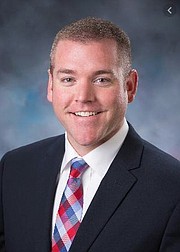COVID-19 shuts down Idaho Legislature
The business of the state came to an abrupt halt Friday, as the Idaho Legislature recessed for at least two weeks in response to several lawmakers testing positive for COVID-19.
Most committee meetings were quickly canceled. Two committees — House Education and Senate State Affairs — met briefly but quickly adjourned.
The House convened for its 9:30 a.m.-scheduled start time and began running down its busy agenda, starting with the standard rituals of invocation and the Pledge of Allegiance. Only a few minutes in, however, the lawmakers voted to recess.
Less than an hour later, the Senate followed suit.
“The House has had several cases of COVID,” Sen. Mary Souza, R-Coeur d’Alene, told the Coeur d’Alene Press. “Most of those were mainly within a committee. So they have decided they will recess for two weeks and come back. And the Senate, we can’t do a lot of work without the House, so we voted to do the same.”
Sen. Steve Vick, R-Dalton Gardens, said he was saddened by the decision but said the health of the lawmakers and employees at the Capitol take precedence.
“It’s disappointing because we were going to be done a week from today,” Vick said. “It’s disappointing we couldn’t finish, but I also think it’s the appropriate precaution to take. We didn’t have any senators missing or ill. All 35 were there to vote to recess today. So this is just a precaution we need to take to help out the House.”
At least six legislators and one staffer have tested positive in the past week. As many as 15 lawmakers and staff members may have tested positive since the session began in January.
Rep. Paul Amador said the contact tracing performed on those who tested positive in the last week — many of whom work in the same committee — could lead to additional positive tests.
“I think that, over the last few days, we’ve seen several members test positive,” Amador, R-Coeur d’Alene, told The Press. “When we start looking at that contact tracing, they’ve been in close proximity with others for long periods of time. So this is precautionary. It will be good to get them back to participate in the process.”
Friday marked one year from when the Idaho Senate voted to adjourn the 2020 session; the House would vote to adjourn the next day. Both chambers were eager to adjourn that session as quickly as possible, hustling to get home as COVID-19 was still in its early throes in Idaho. Gov. Brad Little would declare a statewide emergency five days later.
“Who knew, one year later, we’d be doing the same thing?” Amador said.
Little’s authority and the reach of government during the pandemic has been the focal point of legislation to cross the Idaho House and Senate this session. Those bills include pushes to limit the authority of public health districts, granting the Legislature the power to call itself back into session, and — most recently — HB 281, which calls to prohibit government entities from mandating masks.
Amador said the recent outbreak is unlikely to change anyone’s stance on HB 281, limiting health districts or any other pandemic-related proposals.
“This is truly just a pause,” Amador said. “Everything we were going to debate is still up on the board. Certainly, I think everybody at this point has a good opinion on where they land with government mandates, so I don’t see this really changing things.”
Souza stressed that House members and senators had been discussing a recess anyway, in part to discuss the $2.8 billion in federal funding coming to the state, counties, cities, schools and nonprofits as part of the American Rescue Plan, the $1.9 trillion stimulus package passed by Congress and signed by President Joe Biden earlier in March.
“The thing is, we were always going to take some sort of a recess to deal with the next round of federal COVID money that’s coming in,” Souza said. “We didn’t want to short ourselves, so this will give us an opportunity to determine the direction we want to go with those funds. That’s what these two weeks will be used for.”
Souza said most of the meetings will be held virtually, as many lawmakers are returning to their home districts.
“We won’t be having any formal meetings or big gatherings,” she said. “Nothing like that.”
But many lawmakers will have to devote at least a little of their time shopping for new accommodations. Most legislators keep short-term housing leases through the end of March. With the session now postponed until at least April 6, some are scrambling to find new places to lay their heads.
“That’s a complicating factor,” Amador said. “My lease will be up. I need to figure out a new place to stay when we reconvene.”





